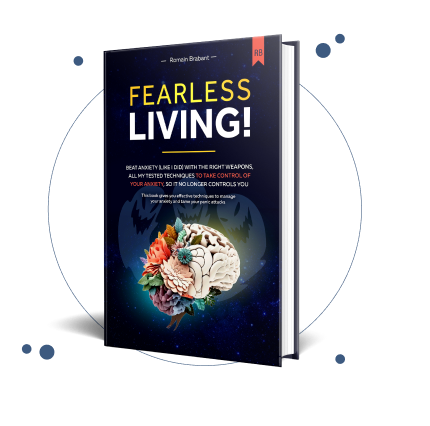
Feeling trapped by anxiety or panic can be an isolating experience, but you are not alone, and there is a clear and effective path forward. Millions have found lasting relief by learning to understand and reshape the thought patterns that fuel their anxiety. This is the core principle of Cognitive Behavioral Therapy (CBT), a proven, practical approach to regaining control over your mental well-being and finding hope.
Today, technology places these powerful CBT tools directly in your pocket, making support accessible whenever you need it. This guide is designed to be more than just a list; it’s a carefully curated resource to help you find the best cognitive behavioral therapy apps for your specific needs. We will explore a range of tools, from comprehensive, structured programs like those offered by Online-Therapy.com and Talkspace to more focused aids like Sleepio for insomnia and The Anxiety Checklist for immediate symptom tracking.
Each review provides an in-depth analysis, complete with screenshots, direct links, and an honest assessment of its features, pricing, and ideal use cases. We’ll show you how these digital tools can become your allies in building resilience, managing symptoms, and finally living the calm, fulfilling life you deserve. To better understand the structured approach these apps embody, you might find it insightful to review professional healthcare CBT treatment plan examples. This guide will empower you with the information needed to take that crucial first step. Healing is possible, and it can begin right now.
1. The Anxiety Checklist
The Anxiety Checklist stands out as a powerful, action-oriented digital toolkit for those seeking a structured, self-directed path to managing anxiety. It moves beyond abstract theory, offering a practical system built from lived experience to help users regain control and live panic-free. This resource is one of the best cognitive behavioral therapy apps for individuals who want tangible, daily actions that build confidence and prove that healing is possible.
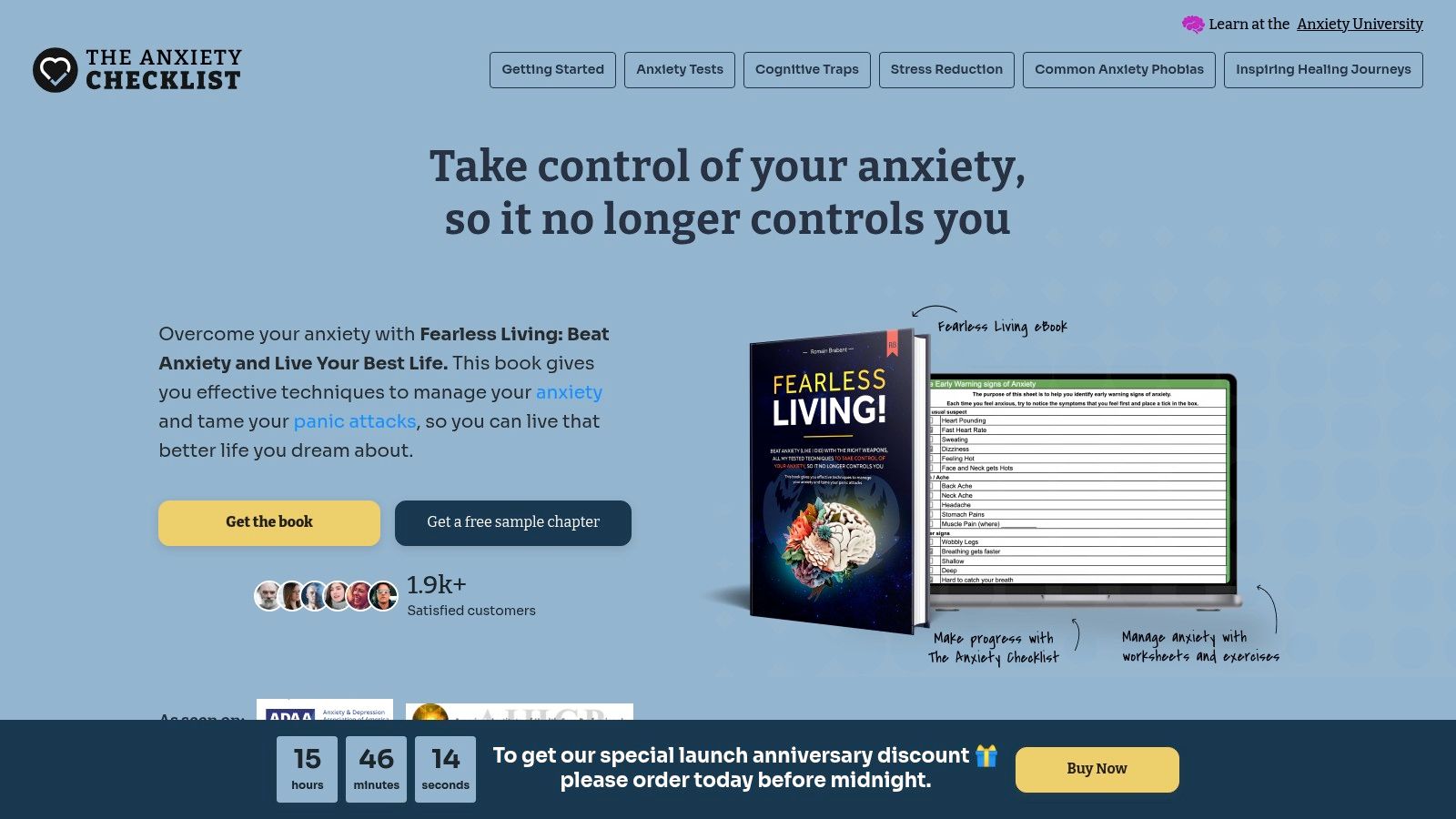
Its core strength lies in translating proven CBT strategies into a 93-point interactive checklist and a suite of customizable worksheets. This design transforms overwhelming anxiety management into a series of small, achievable steps, fostering a sense of accomplishment and hope. The included 10,000-word eBook provides the foundational knowledge on causes, cognitive reframing, and lifestyle adjustments, giving context to the daily actions that lead to a panic-free life.
Key Strengths and Use Cases
- Action-Oriented System: The interactive checklist makes it easy to implement and track daily habits that combat anxiety, turning a vague goal into a concrete routine. It’s ideal for those who feel stuck and need a clear path to begin their healing journey.
- Curated, Evidence-Informed Resources: The toolkit references reputable sources like Harvard Medical School and James Clear, allowing users to explore the science behind the strategies.
- Affordable & Accessible: As a one-time digital purchase with lifetime updates, it’s a cost-effective complement or alternative to traditional therapy. The bundle, including the eBook and checklist, is priced at $47.
- Designed from Lived Experience: Created by someone who successfully navigated 15 years of chronic anxiety, the resource resonates with authenticity and the powerful message that recovery is possible.
While it is not a substitute for professional medical care, The Anxiety Checklist provides an invaluable, structured framework for building resilience. Its focus on actionable steps empowers users to actively participate in their healing journey, offering tangible hope that a life free from the constraints of anxiety is achievable.
Website: https://anxietychecklist.com
2. Life Note
Life Note transforms journaling into conversations with history’s greatest minds—Carl Jung, Marcus Aurelius, Thich Nhat Hanh, and 1,000+ other mentors. Instead of generic AI responses, each mentor offers guidance shaped by their actual writings and philosophies.
What sets Life Note apart is its approach to cognitive reframing. Rather than using scripted CBT exercises, it pairs your journal entries with mentors who’ve faced similar challenges—creating a “tailored journey of self-discovery” that feels more like dialogue than worksheets. The app was designed alongside licensed psychotherapists and includes prompts specifically for anxiety, overthinking, and emotional processing.
**Key Features & User Experience**
The interface is clean and distraction-free. You write, and a mentor responds with thoughtful questions that push you deeper. Features include voice-to-text journaling, a Wisdom Library that saves meaningful responses, mood tracking, and weekly reflection letters summarizing your emotional patterns. The “Talk to Your Past Self” feature lets you hold conversations with earlier entries to track personal growth.
**Pros:**
– 1,000+ mentors across psychology, philosophy, spirituality, and entrepreneurship
– Designed with psychotherapists for genuine therapeutic value
– Strong privacy (AES encryption, no data sharing)
**Cons:**
– Subscription-based ($6.67/month annual or $8.99/month)
– Requires comfort with AI-guided reflection
**Practical Tip:**
Start with Carl Jung or Marcus Aurelius for anxiety work—their approaches to shadow work and Stoic reframing translate well to cognitive restructuring.
Visit Life Note: https://mylifenote.ai
3. Apple App Store
For anyone with an iPhone or iPad, the Apple App Store is the essential starting point for finding effective cognitive behavioral therapy apps. It serves as a secure and well-organized digital marketplace, offering everything from guided CBT journaling and mood trackers to comprehensive programs designed to address specific issues like insomnia (CBT-I) and panic attacks. The platform makes it simple to discover, compare, and install tools that can be a pivotal part of your journey toward healing from anxiety and living a calmer, panic-free life.
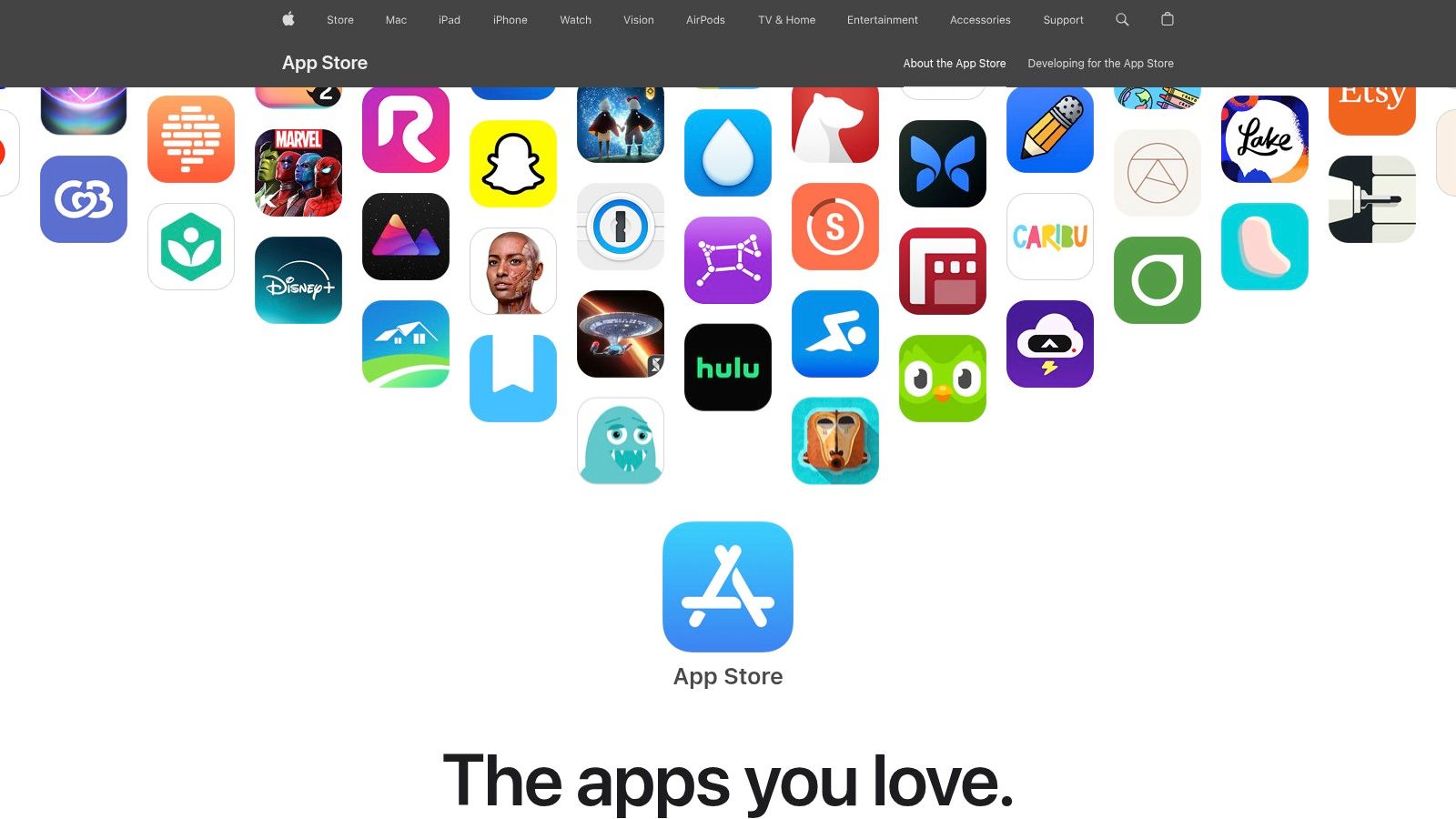
What makes the App Store stand out is its robust ecosystem of user reviews and strict developer guidelines. This focus on quality and transparency helps you make an informed decision, bringing you one step closer to finding the support you need to heal.
Key Features & User Experience
The App Store’s clean interface allows for easy navigation and discovery. You can quickly assess an app’s value by checking its star rating, reading detailed user reviews, viewing its update history, and reviewing clear privacy labels that explain how your data is used. This curated experience ensures you can find high-quality, frequently updated CBT apps with confidence, knowing each download is a step toward hope.
- Pros: Strong app vetting process, clear in-app purchase and subscription information, and a wealth of genuine user reviews.
- Cons: Exclusive to iOS devices, and app pricing can sometimes vary by region or promotional offers.
Practical Tip: Use specific keywords like “CBT for panic” or “thought diary” in the search bar. Also, check the “You Might Also Like” section on an app’s page to discover similar, and sometimes better, alternatives.
Visit the Apple App Store
4. Google Play Store
For Android users, the Google Play Store is the primary gateway to a vast collection of cognitive behavioral therapy apps. It functions as a comprehensive digital marketplace where you can find everything from guided thought records and mood diaries to specialized programs for managing anxiety, panic, and insomnia (CBT-I). The platform simplifies the process of discovering and installing tools that can become a crucial part of your strategy to overcome anxiety and build a more peaceful, resilient life.
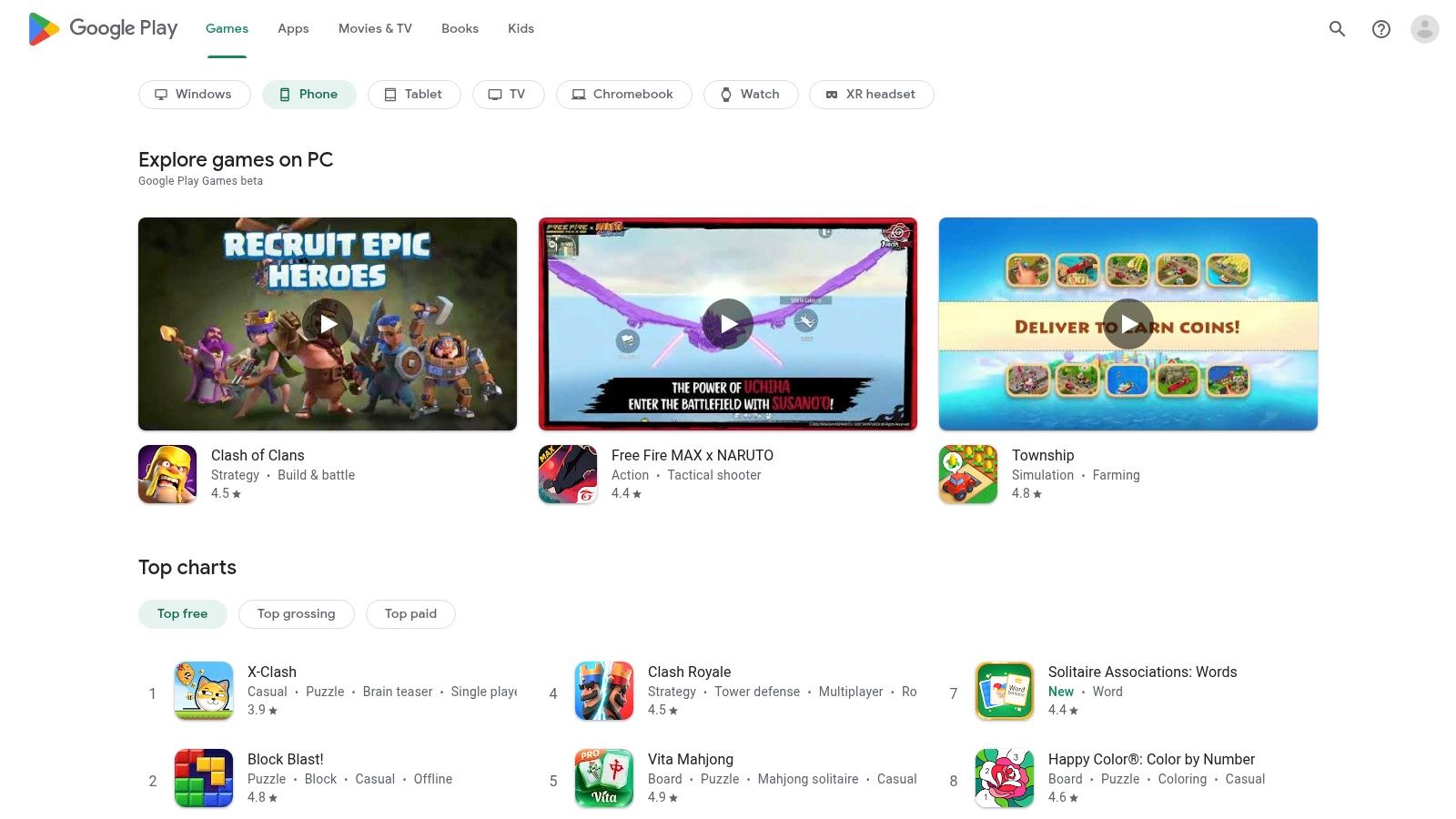
What makes the Google Play Store particularly useful is its sheer volume of options, including many free and freemium apps. This allows for extensive exploration, letting you trial different CBT tools to find the one that truly resonates with your healing process before making a financial commitment, empowering you to find the perfect fit for your journey to a panic-free life.
Key Features & User Experience
The Play Store’s layout is designed for easy discovery. You can quickly vet potential apps by reviewing user ratings, reading detailed feedback, checking install counts, and examining the Data Safety section for a transparent look at how your information is handled. This rich environment helps you sift through the massive selection to find high-quality, effective CBT apps.
- Pros: Extremely broad availability on Android devices, transparent data-safety labels, and the ability to easily trial many free tools.
- Cons: Quality varies significantly across titles, requiring careful review of ratings and updates; some apps may be localized for non-U.S. audiences.
Practical Tip: Search with specific phrases like “CBT thought diary” or “panic attack relief” to narrow down the results. Pay close attention to the “Last updated” date on an app’s page to ensure it’s actively maintained by its developers.
Visit the Google Play Store
5. Sleepio (Big Health)
For those whose anxiety is intertwined with sleep disturbances, Sleepio offers a highly specialized, evidence-based digital program for insomnia. Rooted in cognitive behavioral therapy for insomnia (CBT-I), this app provides a structured path toward better rest, which is fundamental to managing anxiety and finding a calmer state of mind. By addressing the root causes of poor sleep, Sleepio helps you rebuild a healthy sleep cycle, a crucial step in your journey to living a life free from the grip of panic.
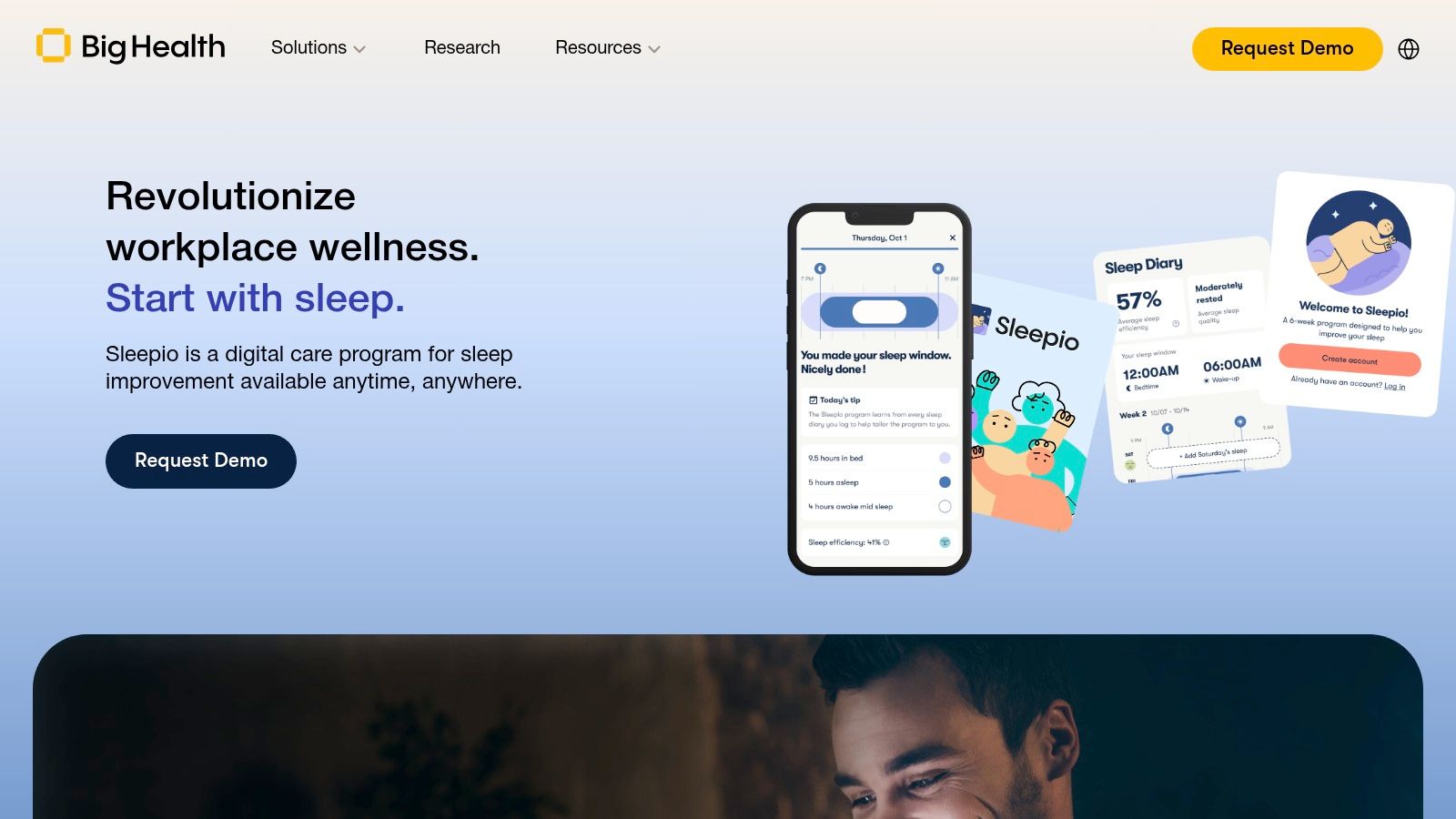
What makes Sleepio stand out is its strong clinical validation and unique access model. It is often available at no cost through employers or health plans, and it also has an FDA-cleared prescription version, SleepioRx, that a provider can order, highlighting its credibility as a therapeutic tool that offers real hope for restorative sleep.
Key Features & User Experience
Sleepio guides you through a personalized six-week program featuring a virtual sleep expert, cognitive exercises, and a detailed sleep diary. The interface is supportive and easy to follow, breaking down complex CBT-I principles into actionable weekly sessions. Beyond the app, understanding the broader connection between sleep and mental health can further empower you to create a restorative sleep environment and reclaim your nights.
- Pros: Strong clinical evidence with proven outcomes, multiple no-cost access routes through employers or health plans, and a structured, easy-to-follow program.
- Cons: Direct-to-consumer self-pay options are not widely available, and access often requires going through an employer, health plan, or provider prescription.
Practical Tip: Check with your employer’s benefits administrator or your health insurance provider first to see if you have covered access to Sleepio before seeking other options.
Visit Sleepio
6. Daylight (Big Health)
For those looking for a structured, science-backed program specifically for managing worry and anxiety, Daylight offers a compelling solution. Developed by Big Health, this app functions as an automated digital therapy program, delivering personalized, bite-sized CBT sessions and daily practices directly to your smartphone. It’s designed to help you understand the patterns behind your anxiety and build practical skills, offering a clear path toward reclaiming control and living a more peaceful, panic-free life.
What makes Daylight unique is its access model and clinical validation. It is often available at no cost through employers or health plans, and it even has an FDA-cleared version, DaylightRx, that can be prescribed by a clinician for generalized anxiety disorder. This focus on evidence-based outcomes makes it one of the best cognitive behavioral therapy apps for those seeking a clinically robust tool that truly works.
Key Features & User Experience
Daylight guides users through its program with a friendly, conversational interface, using audio and animation to teach proven CBT techniques. The app helps you identify and reframe anxious thoughts, a core skill for managing anxiety. You can learn more about how to challenge these unhelpful thinking patterns, also known as cognitive distortions, to reduce their power over you. The experience is designed to be supportive and accessible whenever worry strikes, reminding you that you have the tools to heal.
- Pros: Structured, evidence-based CBT workflows available 24/7, often covered by employers, and includes an FDA-cleared prescription option for clinical use.
- Cons: Direct consumer access is limited, as it often requires enrollment through a participating employer, health plan, or provider.
Practical Tip: Check with your HR department or health insurance provider first to see if they offer Daylight as a covered mental health benefit. This is the most common and cost-effective way to access the full program.
Visit Daylight (Big Health)
7. SilverCloud by Amwell
SilverCloud offers a unique, clinically-backed approach to digital mental health, making it one of the best cognitive behavioral therapy apps available through organizational partnerships. Rather than being a direct-to-consumer app, it is a secure, enterprise-grade platform used by health plans, employers, and universities. This model ensures that users receive high-quality, evidence-based CBT programs designed to address depression, anxiety, and comorbid conditions, creating a structured and hopeful path toward healing and a calmer life.
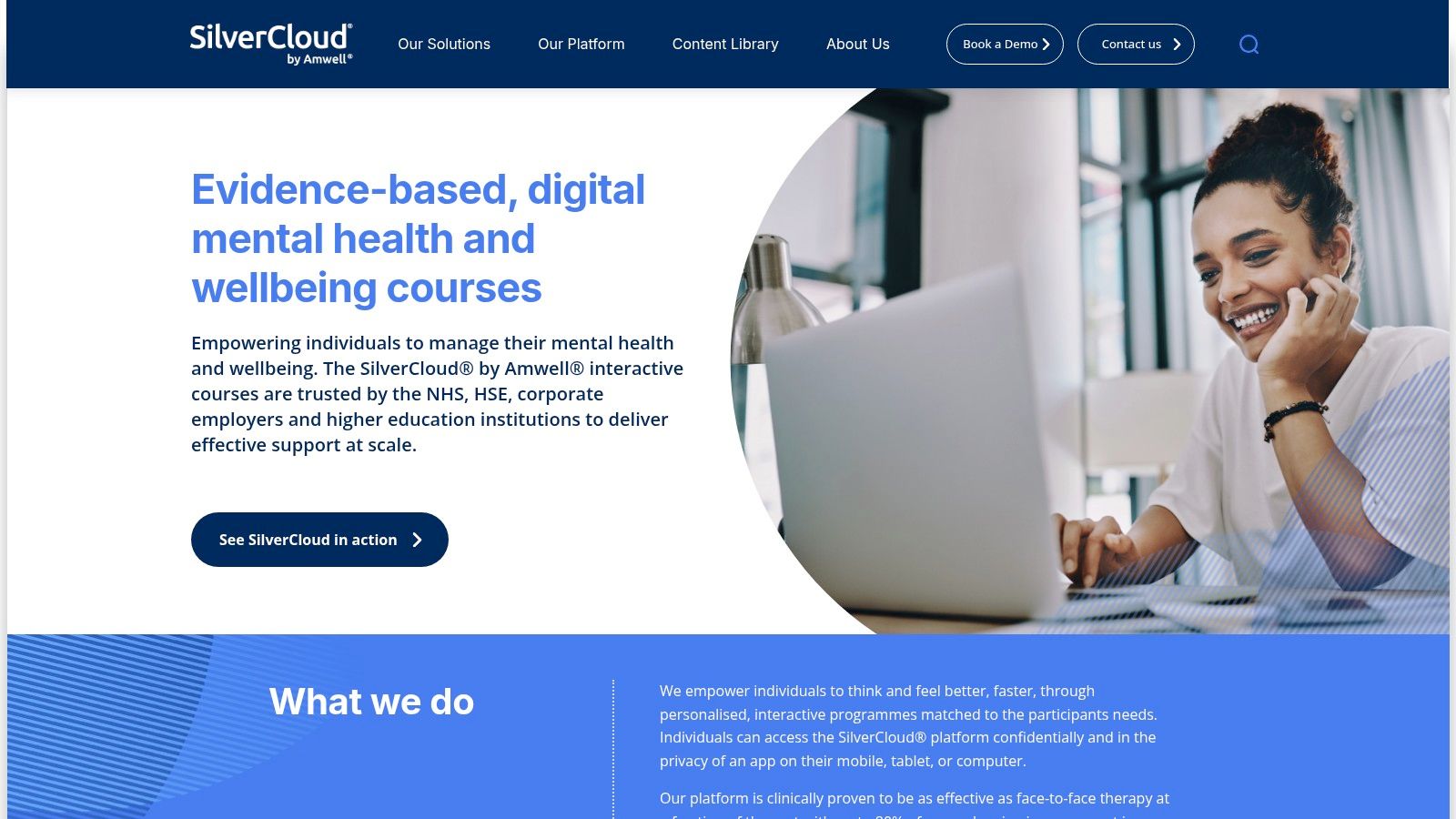
What makes SilverCloud stand out is its integration into existing care pathways. Users can access either self-guided modules or programs supported by a therapist or coach, providing a level of personalized care and accountability that is often missing from standard apps. This structured support system can be instrumental in managing symptoms effectively and making lasting progress toward a life free from panic.
Key Features & User Experience
The platform is built on proven CBT protocols, offering interactive modules, journaling tools, and progress-tracking features. Because it’s an enterprise solution, the user experience is professional and streamlined, focusing on clinical effectiveness. Clinicians and program administrators have access to dashboards to monitor engagement and outcomes, ensuring users are well-supported on their journey to living panic-free.
- Pros: Strong clinical evidence and proven effectiveness, and multiple access routes through health plans, employers, or universities.
- Cons: No direct sign-up for consumers; access requires a referral or coverage from a participating organization.
Practical Tip: Check with your employer’s HR department, your university’s student wellness center, or your health insurance provider to see if they offer SilverCloud as a covered mental health benefit. If you are unsure about your anxiety levels, you can learn more about the GAD-7 anxiety test to get a better understanding.
Visit SilverCloud by Amwell
8. U.S. Department of Veterans Affairs – CBT‑i Coach
For those struggling with insomnia, a common trigger and symptom of anxiety, CBT-i Coach offers a powerful and entirely free solution. Developed through a collaboration between the VA’s National Center for PTSD, Stanford University, and the Department of Defense, this app is an evidence-based digital companion for Cognitive Behavioral Therapy for Insomnia (CBT-I). It provides a structured path to rebuilding healthy sleep habits, which is a fundamental step toward achieving a calmer, more resilient state of mind and a life free of panic.
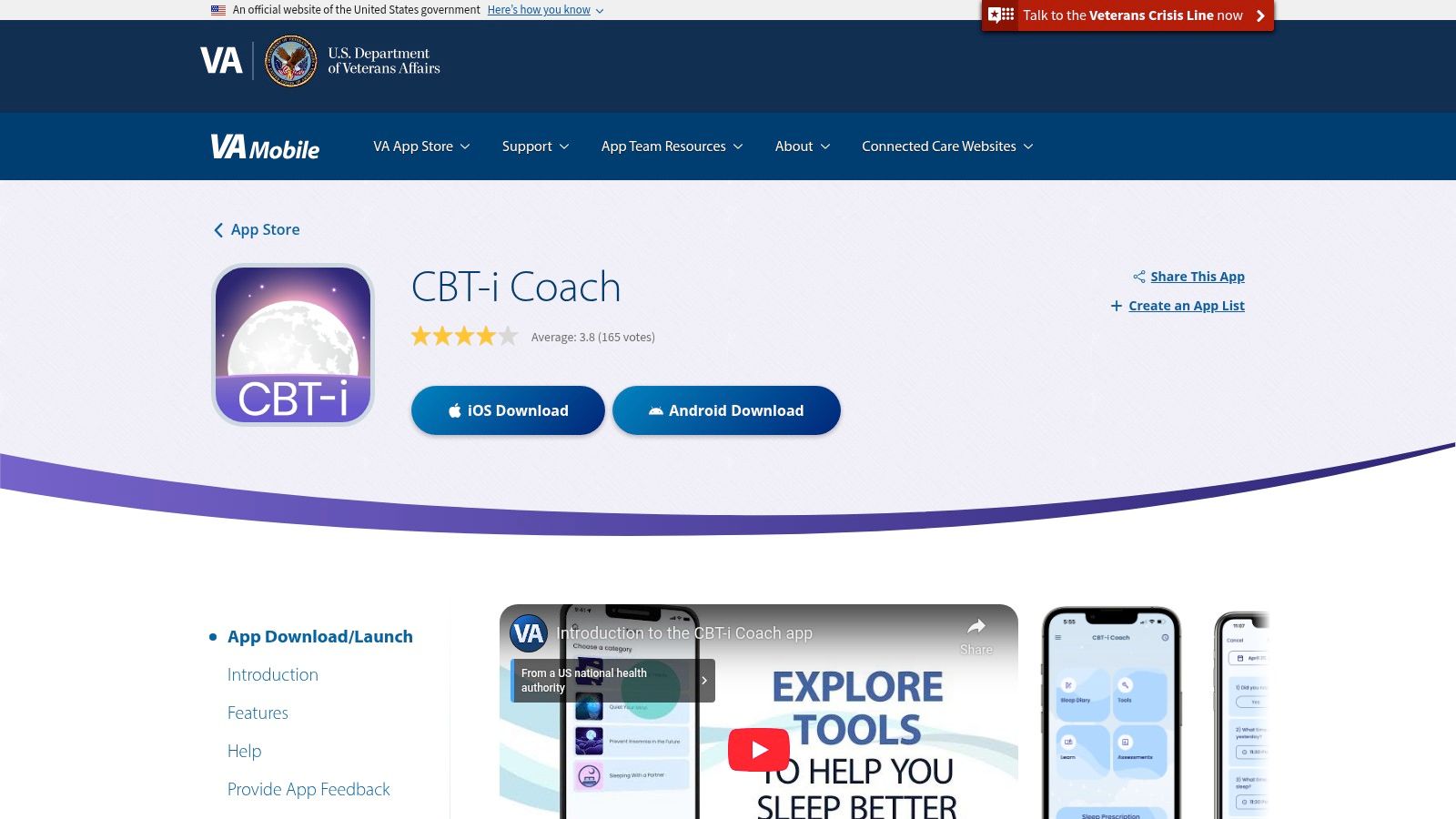
What makes CBT-i Coach exceptional is its credibility and accessibility. It delivers a clinical-grade program, designed to be used alongside a therapist or as a self-help tool, without any costs, ads, or subscriptions. This focus on public health makes it one of the most trustworthy and effective CBT apps available for a specific, critical need, showing that powerful help is available to everyone.
Key Features & User Experience
The app’s interface is functional and goal-oriented, guiding you through the core components of CBT-I. It features a detailed sleep diary to track patterns, provides education on sleep hygiene, and offers tools for stimulus control to re-associate your bed with sleep. Its guided relaxation exercises can be particularly helpful for calming a racing mind before bed. You can explore a variety of techniques, similar to these breathing exercises for anxiety, to find what works best for you and take back your nights.
- Pros: Completely free with no ads, backed by credible federal and academic institutions, and provides a structured, evidence-based program.
- Cons: The interface is more utilitarian than modern commercial apps, and it is most effective when used with guidance from a clinician.
Practical Tip: Consistently use the sleep diary for at least two weeks to gather accurate data. This information is crucial for identifying patterns and effectively applying the app’s stimulus control and sleep restriction recommendations.
Visit the U.S. Department of Veterans Affairs – CBT‑i Coach
9. Sleep Reset
For those whose anxiety and panic are deeply intertwined with sleep issues, Sleep Reset offers a highly specialized solution using cognitive behavioral therapy for insomnia (CBT-I). This app delivers a structured, consumer-facing program designed to rebuild healthy sleep habits from the ground up. It provides a clear path to overcoming the vicious cycle of poor sleep and heightened anxiety, offering hope that restful nights and calmer days are achievable.
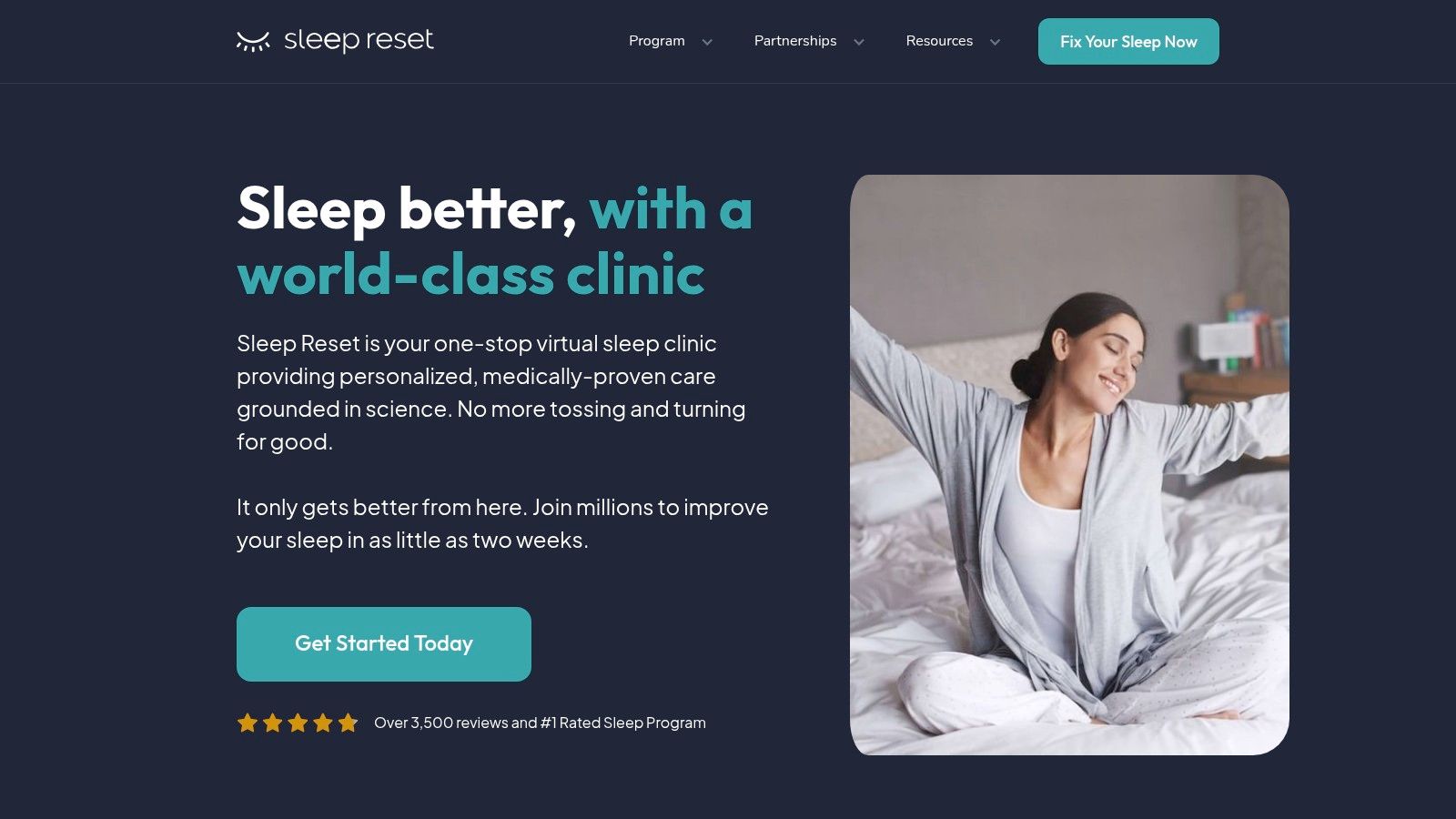
What makes Sleep Reset unique is its focused application of proven CBT-I methods, such as sleep restriction and stimulus control, combined with optional human coaching. This blend of automated tools and personalized support makes it one of the best cognitive behavioral therapy apps for tackling sleep-related anxiety head-on and finally getting the restorative sleep you deserve.
Key Features & User Experience
Sleep Reset guides you through a personalized action plan based on your sleep logs and progress tracking. The interface is clean and goal-oriented, focusing on daily tasks and education to help you understand and change your relationship with sleep. The optional coaching via in-app messaging provides accountability and expert guidance, which can be invaluable when implementing challenging techniques on your path to healing.
- Pros: Strong focus on evidence-based CBT-I, clear consumer checkout with HSA/FSA availability, and high user ratings on the App Store.
- Cons: The upfront program cost can be high compared to freemium apps, and the one-time purchase model may not suit everyone’s budget.
Practical Tip: Before starting, commit to consistently logging your sleep for at least a week. Accurate baseline data will significantly improve the personalization and effectiveness of your action plan.
Visit Sleep Reset
10. Stellar Sleep
For those whose anxiety and panic are worsened by poor sleep, Stellar Sleep offers a highly specialized solution using cognitive behavioral therapy for insomnia (CBT-I). This app delivers a structured, personalized program designed to reset your sleep patterns, which can be a foundational step toward managing daytime anxiety. By tackling the root causes of insomnia, it provides a clear path to restorative rest, helping you build the resilience needed to live a calmer, more balanced, and panic-free life.
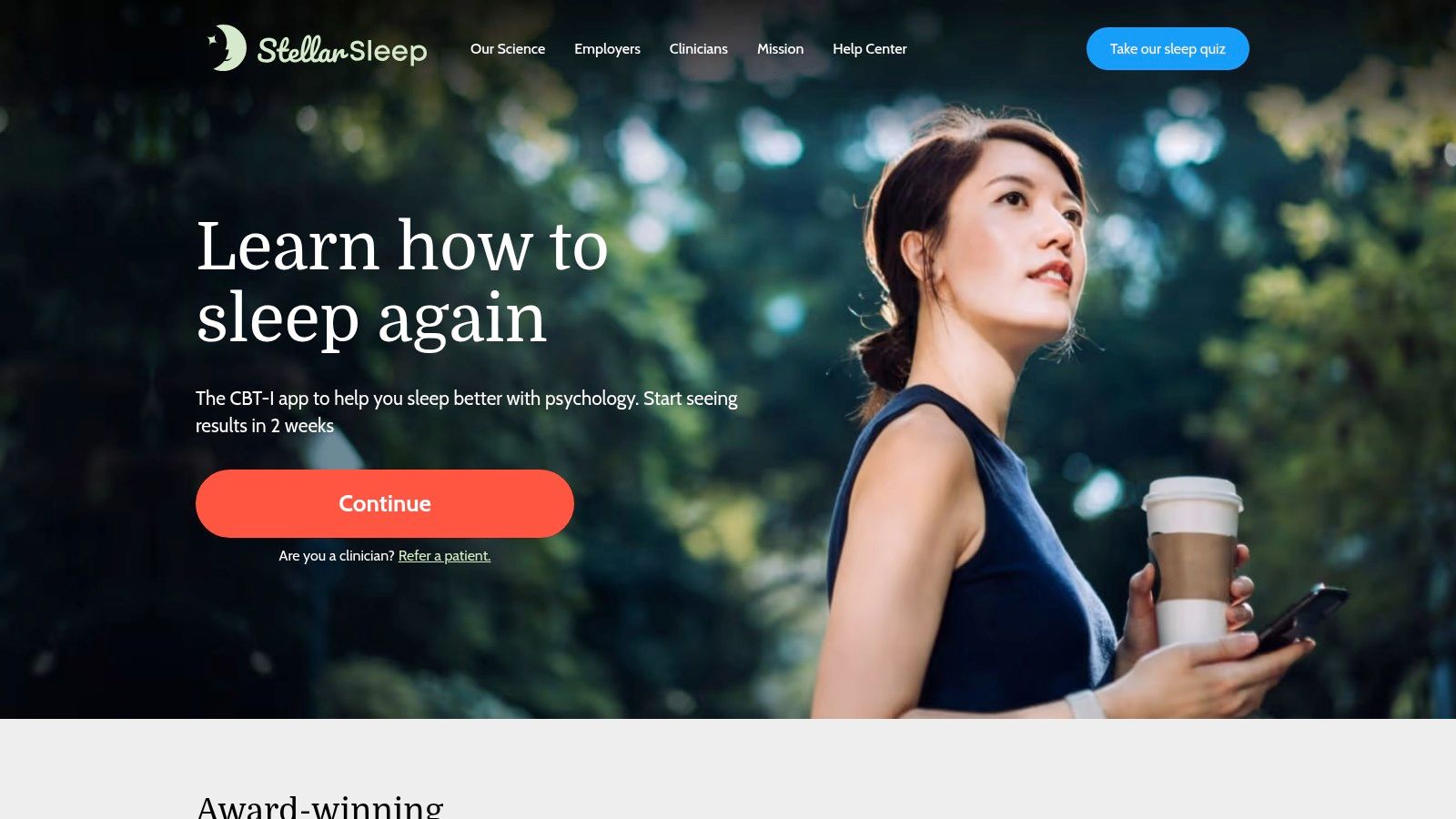
What makes Stellar Sleep one of the best cognitive behavioral therapy apps in its niche is its direct-to-consumer model with remarkable transparency. It offers clear pricing, a 30-day money-back guarantee, and even financial assistance, making a clinically-proven methodology more accessible and providing hope for everyone who struggles with sleep.
Key Features & User Experience
Stellar Sleep guides you through a personalized CBT-I plan based on your daily sleep diary entries, providing a custom sleep schedule and actionable techniques. The iOS app is well-regarded for its user-friendly interface and progress-tracking metrics that keep you motivated on your journey to better nights and brighter days. This focused approach on a single, critical area of well-being is its greatest strength.
- Pros: Specialized CBT-I program, transparent consumer pricing with a refund policy, and financial assistance options to improve accessibility.
- Cons: Base subscription price is higher than some general-purpose CBT apps, and the program’s cost can be a significant investment for some users.
Practical Tip: Before committing, take advantage of the app’s initial assessment to understand its approach. If the cost is a barrier, be sure to explore the financial assistance options clearly detailed on their website to see if you qualify for a reduced rate.
Visit Stellar Sleep
11. MindDoc
MindDoc serves as a comprehensive mental health companion, blending sophisticated mood tracking with a library of CBT-based courses. Developed with clinical psychologists, it’s designed to help you understand the connection between your thoughts, feelings, and actions, which is a core principle of cognitive behavioral therapy. This app offers a structured yet flexible path for anyone looking to actively work on their emotional well-being and find a more balanced, peaceful state of mind.
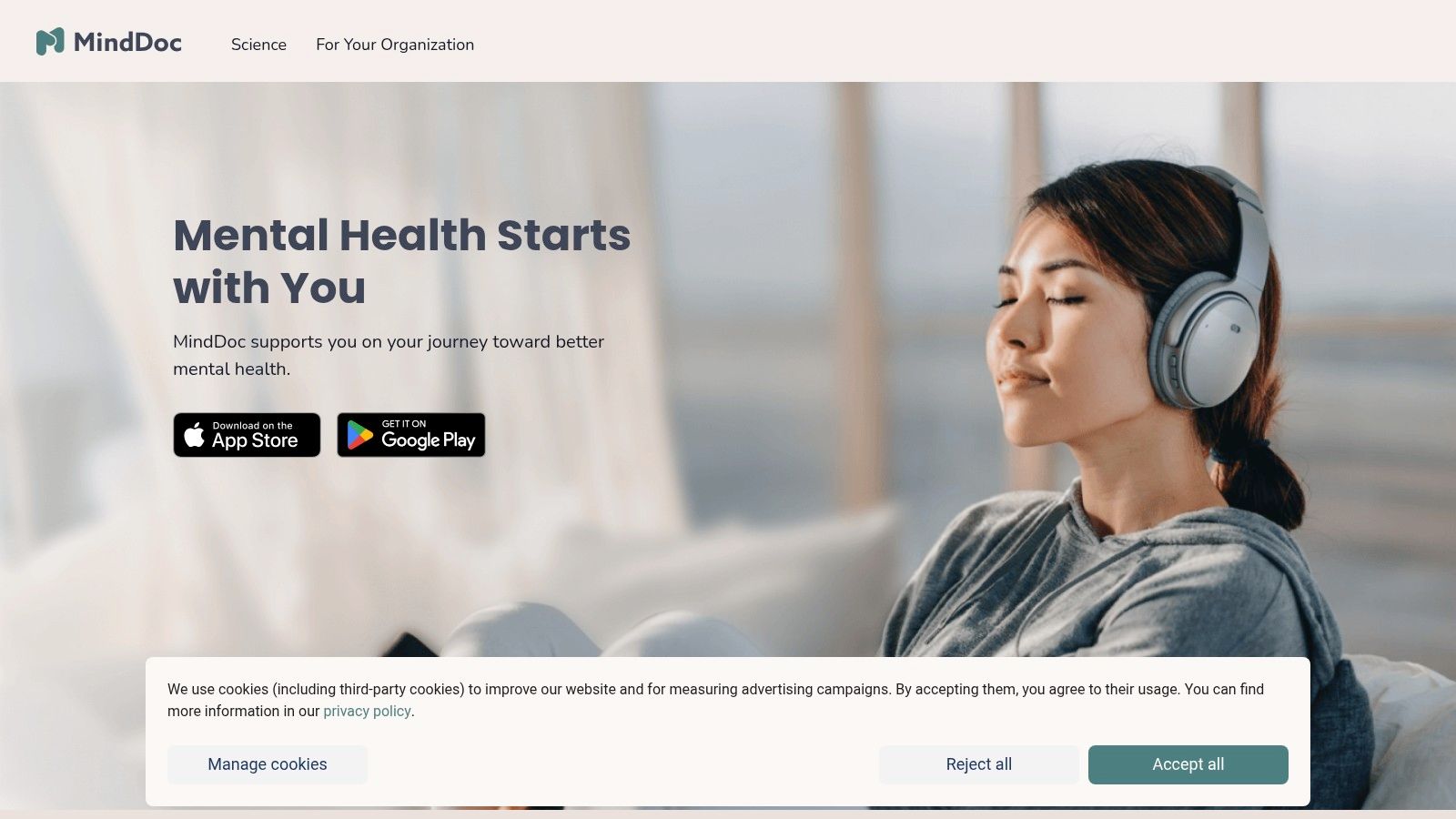
What sets MindDoc apart is its intelligent feedback loop. After 14 days of consistent tracking, the app provides personalized insights into your emotional health patterns, helping you identify triggers and areas for growth. This data-driven approach transforms simple tracking into a powerful tool for self-awareness and healing from anxiety, showing you that change is within reach.
Key Features & User Experience
The app’s interface is clean and user-friendly, prompting you with relevant questions about your mood and experiences throughout the day. It offers a rich library of courses covering topics like stress, self-esteem, sleep, and relationships, making it one of the more versatile best cognitive behavioral therapy apps available. This structured learning empowers you with practical skills to manage difficult emotions. For those wanting a deeper dive into the methodology, you can get a solid primer on understanding CBT for anxiety.
- Pros: Strong clinical foundation, combines mood tracking with structured psychoeducational courses, and provides personalized insights.
- Cons: The most valuable courses and features are behind a premium subscription; it is a self-help tool, not a substitute for therapy.
Practical Tip: Use the daily check-ins as moments of mindfulness. Be honest with your responses to get the most accurate and helpful insights from the 14-day assessment reports.
Visit MindDoc
12. Online-Therapy.com
For those who want the structure of an app combined with direct human guidance, Online-Therapy.com offers a unique hybrid model. It is one of the best cognitive behavioral therapy platforms because it directly pairs you with a licensed therapist for live sessions while also providing a comprehensive, self-guided eight-section CBT program. This integrated approach ensures you are not just learning concepts but actively applying them with professional feedback, creating a powerful pathway to managing anxiety and reclaiming a sense of calm.
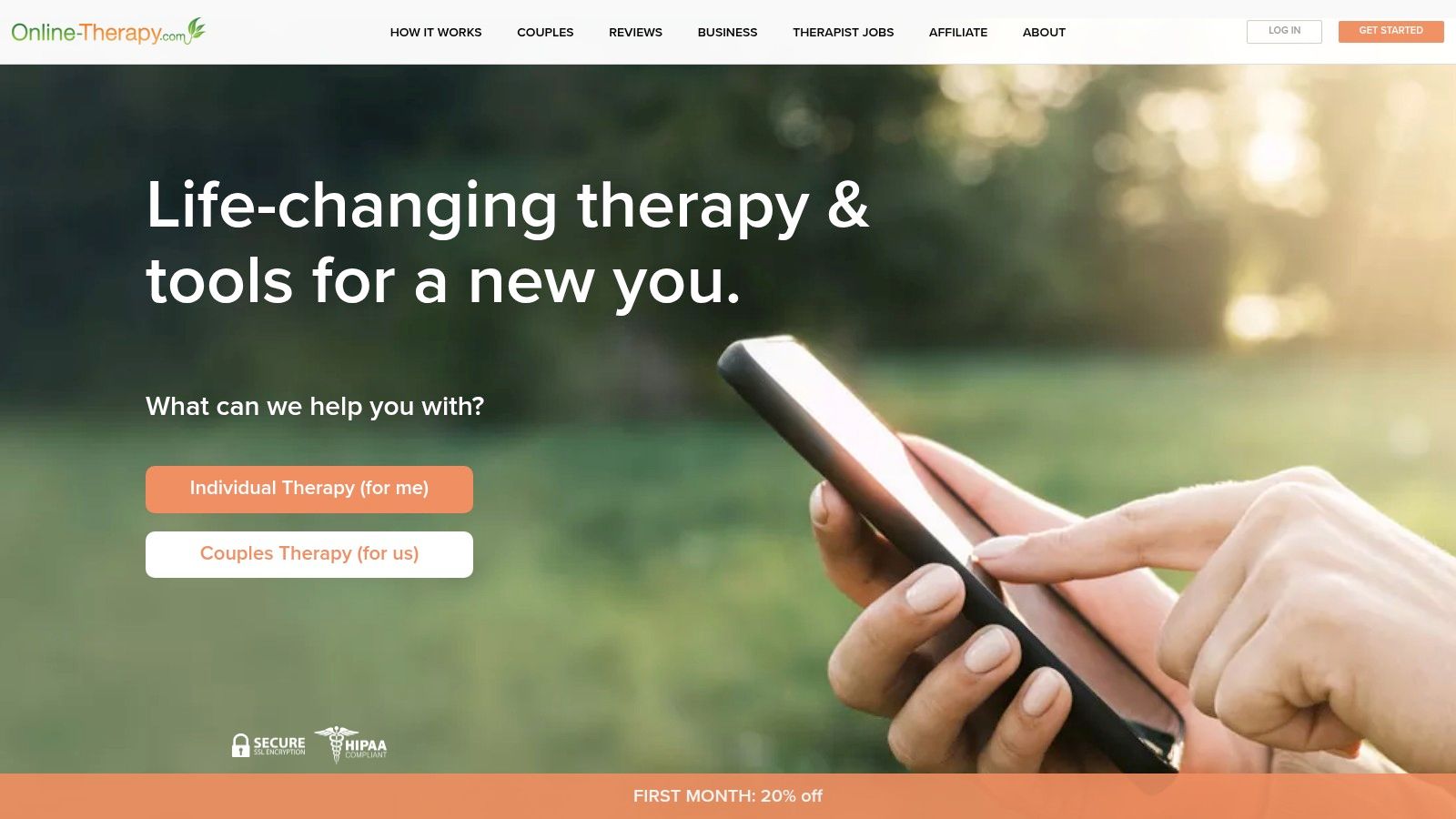
What makes this platform stand out is its explicit focus on CBT. Unlike general therapy sites, its entire ecosystem, from worksheets to therapist messaging, is built around this evidence-based methodology. It provides a structured yet personalized experience for those serious about making lasting changes and achieving a panic-free life.
Key Features & User Experience
The platform is designed to be a complete therapeutic toolkit. Users work through a curriculum of 25+ worksheets and receive daily therapist feedback on their entries from Monday to Friday. This consistent engagement helps reinforce learning and builds momentum. The combination of live sessions (video, voice, or chat) and unlimited messaging provides a supportive and accountable environment, which you can learn more about in this guide to psychotherapy for anxiety.
- Pros: Combines live therapy with a full structured CBT program and dedicated homework, and offers options for both individuals and couples.
- Cons: The weekly subscription model can be complex, and it has more limited insurance coverage compared to some larger competitors.
Practical Tip: Fully engage with the worksheets and daily journal. The more information you provide, the more specific and helpful your therapist’s daily feedback will be, accelerating your progress through the program.
Visit Online-Therapy.com
13. Talkspace
Talkspace offers a powerful bridge between self-guided apps and traditional therapy, providing direct access to licensed clinicians who specialize in cognitive behavioral therapy. It functions as a comprehensive online therapy platform where you can connect with a professional for support in managing anxiety and panic. This approach combines the convenience of an app with the personalized guidance essential for lasting healing and learning to live a panic-free life.
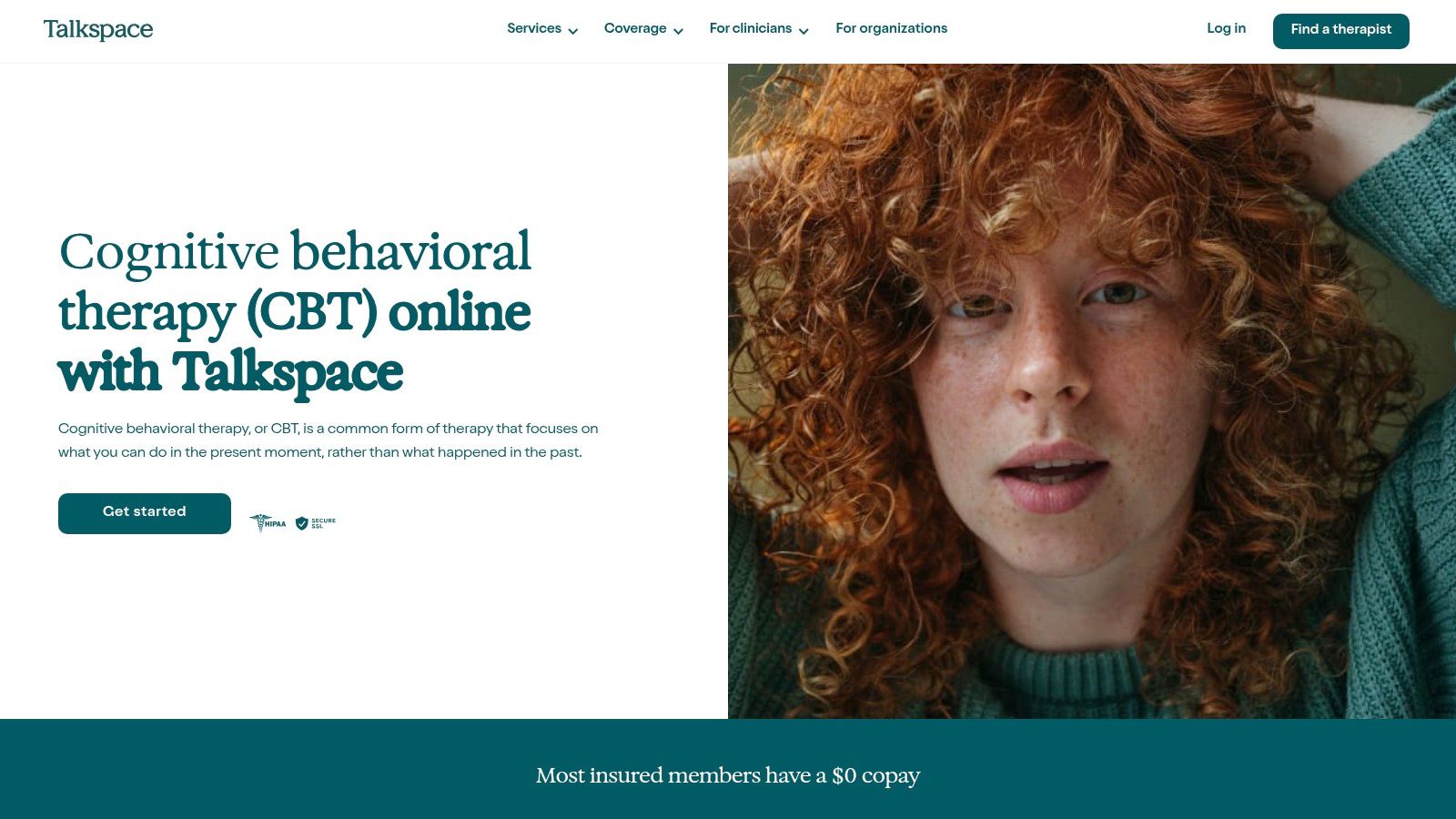
What makes Talkspace a standout choice is its integration with numerous health insurance plans, EAPs, and employers. This focus on accessibility often makes professional CBT guidance significantly more affordable, removing a major barrier and giving more people hope and a way to heal.
Key Features & User Experience
The platform allows users to choose a plan that fits their needs and communication style, from messaging-only options to plans that include live video sessions. After a brief assessment, you are matched with a therapist, though you have the flexibility to switch if the fit isn’t right. The app serves as a secure space to apply CBT principles with professional oversight, empowering your journey to wellness.
- Pros: Widespread insurance coverage and EAP partnerships, flexible communication options (messaging and video), and access to licensed therapists.
- Cons: Messaging-only plans may feel insufficient for complex issues, and the quality of the therapist match can vary.
Practical Tip: Before signing up, use the coverage checker on their website to see if your insurance or employer will cover the cost. Be clear with your matched therapist about your goal to use CBT techniques so they can structure your sessions accordingly.
Visit Talkspace
Top 13 CBT Apps: Feature Comparison
| Product | Core features | UX / Quality (rating) | Price / Value 💰 | Target audience 👥 | Unique selling point ✨ |
|---|---|---|---|---|---|
| The Anxiety Checklist 🏆 | 10,000‑word eBook + 93‑pt interactive checklist + customizable worksheets | ★★★★☆ — strong testimonials (~1.9k) | 💰 eBook $19; Checklist $28; Bundle $47; lifetime updates | 👥 Self‑helpers, busy therapists, concerned loved ones | ✨ Action‑oriented checklist; lived‑experience design; lifetime updates |
| Apple App Store | Central iOS catalogue; app reviews & privacy labels; one‑tap install | ★★★★☆ — curated + frequent updates | 💰 Free→varies by app / in‑app purchases | 👥 iPhone/iPad users seeking CBT apps | ✨ Editorial discovery & vetted store info |
| Google Play Store | Large Android library; install counts; data‑safety labels | ★★★☆☆ — wide variety; quality varies | 💰 Free→varies; many freemium options | 👥 Android/Chromebook users | ✨ Broad availability & easy trialing |
| Sleepio (Big Health) | 6‑week tailored CBT‑I program; sleep diary & tracking | ★★★★★ — RCTs & guideline links | 💰 Often free via employers/plans; Rx pathway | 👥 Chronic insomnia sufferers; employers/plans | ✨ Strong clinical evidence; SleepioRx (FDA‑cleared) |
| Daylight (Big Health) | Personalized CBT for worry; bite‑size sessions | ★★★★☆ — evidence of outcomes | 💰 Plan/provider access common; consumer pricing unclear | 👥 People with anxiety/GAD; employer programs | ✨ 24/7 structured CBT workflows; DaylightRx option |
| SilverCloud by Amwell | Therapist‑supported & self‑guided CBT modules; referrals | ★★★★☆ — enterprise‑grade effectiveness | 💰 Access via plan/employer/referral (no direct checkout) | 👥 Health plans, employers, campuses, clinicians | ✨ Scalable clinical integration & referral workflows |
| U.S. VA — CBT‑i Coach | Sleep diary, stimulus control, relaxation tools; no ads | ★★★★☆ — federal & academic backing | 💰 Free | 👥 Veterans & civilians seeking CBT‑I self‑help | ✨ Free, credible federal/Stanford/DoD collaboration |
| Sleep Reset | CBT‑I methods + coach messaging option; personalized plans | ★★★★☆ — strong consumer ratings | 💰 Upfront program cost (variable); HSA/FSA availability | 👥 Consumers wanting guided CBT‑I + coach | ✨ Consumer checkout + optional human coach |
| Stellar Sleep | Personalized CBT‑I plan; 30‑day money‑back & financial aid | ★★★★☆ — high app ratings | 💰 Higher price (~$188 start); refunds & aid | 👥 Consumers who need transparent pricing & aid | ✨ Refunds + financial assistance options |
| MindDoc | Mood tracking + CBT micro‑courses; clinical dev background | ★★★★☆ — popular, many reviews | 💰 Freemium → subscription for premium content | 👥 Self‑help users wanting tracking + courses | ✨ Clinical development (ISO/GDPR) & structured courses |
| Online‑Therapy.com | Live therapist CBT + 8‑section curriculum & worksheets | ★★★★☆ — therapist‑led CBT + homework | 💰 Weekly‑billed subscription (monthly min) | 👥 Users wanting live CBT with structured homework | ✨ Combines live sessions with daily CBT homework |
| Talkspace | Marketplace for licensed clinicians; messaging & video plans | ★★★★☆ — flexible access; insurance integrations | 💰 Plan tiers; often covered by insurance/EAPs | 👥 Users with insurance/employer coverage | ✨ Multiple plan types + employer/insurance partnerships |
Your Next Step Towards a Fearless Life
Navigating the landscape of mental health support can feel overwhelming, but as we’ve explored, technology has opened up a world of accessible, effective options. Throughout this guide, we’ve dissected some of the best cognitive behavioral therapy apps available, from structured, self-guided programs like The Anxiety Checklist to comprehensive, therapist-supported platforms such as Talkspace and Online-Therapy.com. Each tool offers a unique and hopeful pathway to reclaiming your mental peace.
The central takeaway is this: you have the power to change your relationship with anxiety and panic. The journey isn’t about finding a single, perfect solution. Instead, it’s about discovering the right combination of strategies and support that resonates with your personal needs, lifestyle, and goals. The feeling of hope you have right now is the most powerful catalyst for change. Hold onto it, and let it fuel your first step toward a life free from panic.
Making Your Choice: How to Select the Right CBT App
Choosing the right tool is a critical step. An app that feels like a chore will be quickly abandoned, while one that aligns with your needs can become a trusted companion on your path to healing. Before you commit, reflect on what you truly need at this moment.
Consider these key factors to guide your decision:
- Level of Support: Are you looking for a self-guided tool to learn and practice CBT skills independently, like The Anxiety Checklist or MindDoc? Or do you feel you would benefit from the accountability and personalized guidance of a licensed therapist, as offered by platforms like SilverCloud or Talkspace? Be honest about the level of interaction you require.
- Specific Goals: Are you targeting a specific issue? If insomnia is exacerbating your anxiety, a specialized app like Sleepio, Stellar Sleep, or CBT-i Coach is a logical starting point. If you’re dealing with generalized anxiety during the day, Daylight might be a better fit.
- Learning Style: Do you prefer a highly structured, educational approach with clear lessons and worksheets, like Online-Therapy.com? Or do you thrive with a more interactive, check-in-based system that helps you track your moods and thoughts over time, like MindDoc?
- Budget: Your financial situation is a practical and important consideration. Free resources like CBT-i Coach offer incredible value, while subscription-based apps provide ongoing support and features. Consider what represents a sustainable investment in your well-being.
From Download to Daily Practice: Implementing Your New Tool
Simply downloading an app is not enough. The transformative power of CBT lies in consistent application. The goal is to move from passively consuming information to actively practicing the techniques in your daily life, proving to yourself that you can heal.
To make your chosen app a successful part of your routine, commit to these implementation strategies:
- Schedule It In: Treat your app usage like any other important appointment. Set aside 10-15 minutes each day, perhaps in the morning or before bed, to engage with the material. Consistency is more important than intensity.
- Be Patient with Yourself: Learning to manage anxiety is a skill, and like any skill, it takes practice. There will be good days and challenging days. The goal is not perfection but persistent progress on your healing journey.
- Integrate, Don’t Isolate: Use the app as a springboard for real-world practice. If you learn a breathing technique, use it before a stressful meeting. If you complete a thought record, reflect on how that cognitive reframe changes your feelings throughout the day.
You have now seen the evidence: recovery from chronic anxiety and panic attacks is not a distant dream but an achievable reality. The tools are available, the science is proven, and the potential for a calmer, more fearless life is within your grasp. You are fully capable of this transformation. The most important step is simply the next one you decide to take.
Ready to turn your knowledge into action with a clear, step-by-step framework? The Anxiety Checklist from The Anxiety Checklist is designed to bridge the gap between learning CBT principles and applying them daily to overcome anxiety and panic. Get started with the structured guidance you need to build a panic-free future by visiting The Anxiety Checklist today.

